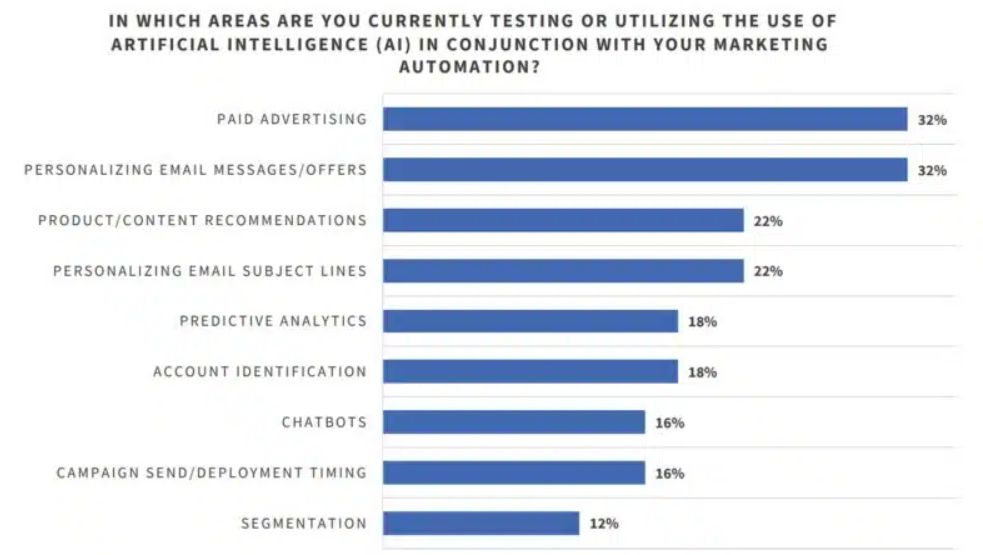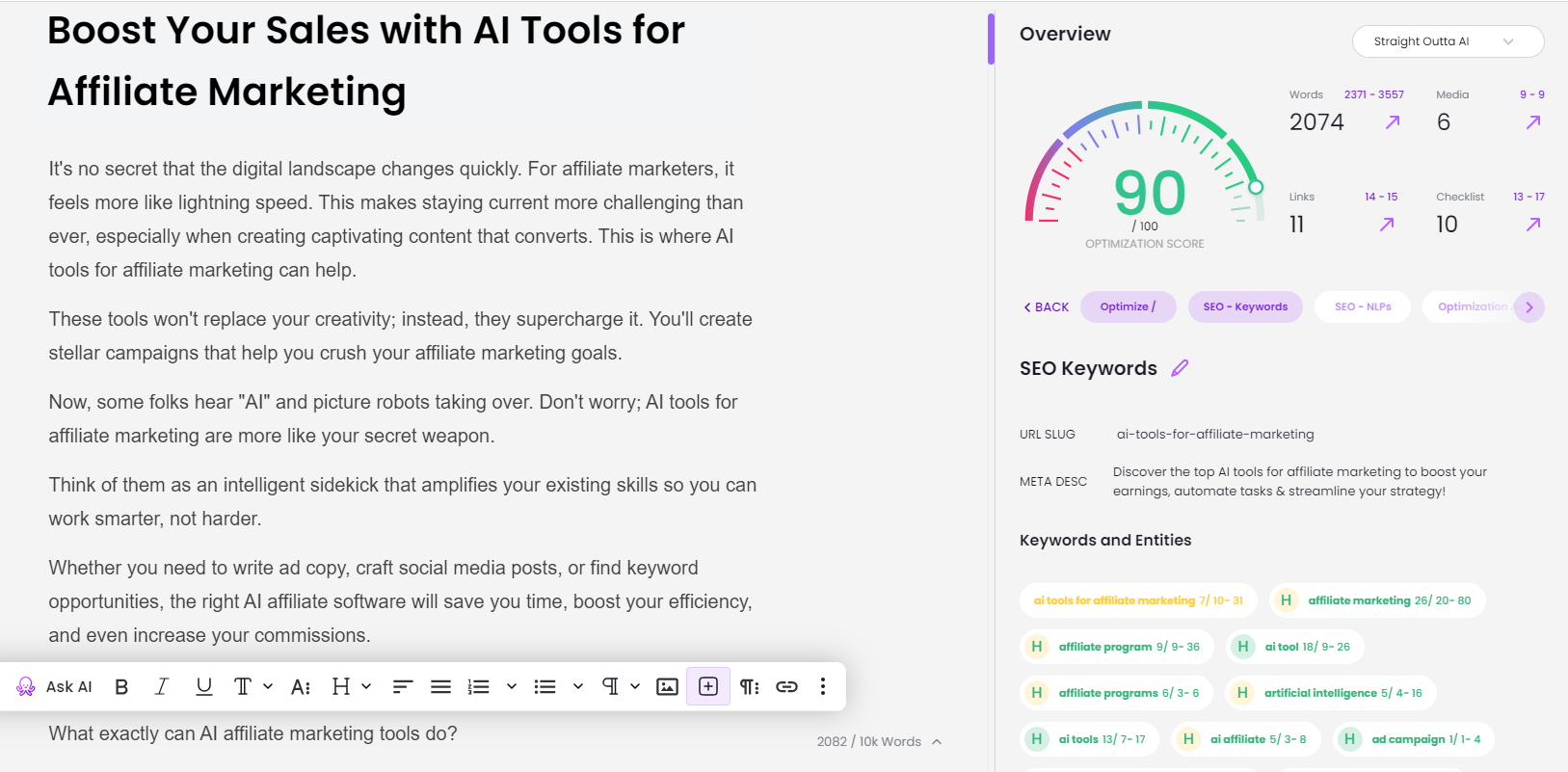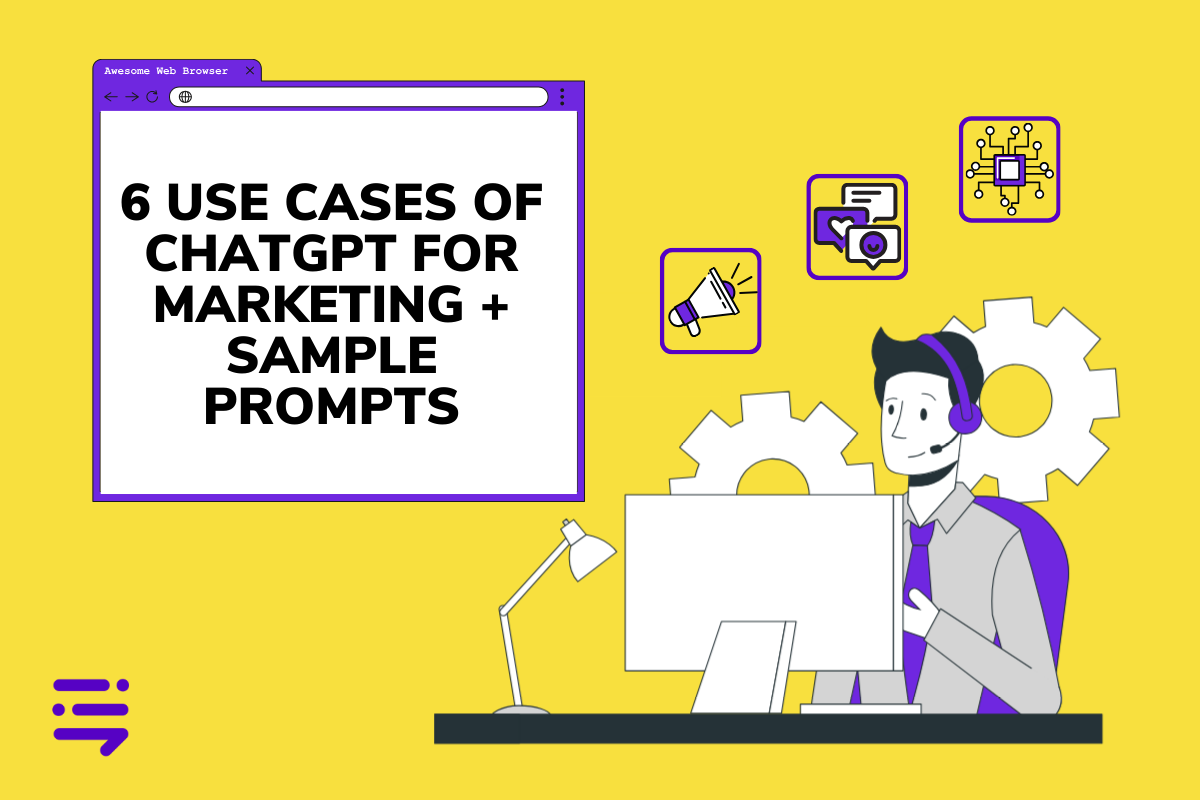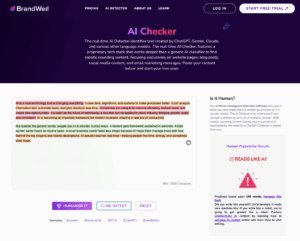Ever tried to juggle? Keeping those balls in the air can feel a lot like managing your marketing efforts. Content creation, customer support, lead generation, ad campaigns — it’s all up there.
Now imagine you have an extra pair of hands. A partner who never gets sick or takes vacations and brings creativity and precision to the task at hand. That’s what using ChatGPT for marketing feels like.
A breakthrough AI tool that revolutionizes digital marketing practices, ChatGPT takes over your mundane tasks so you can focus on strategy rather than just keeping those balls from hitting the ground.
You’re about to discover how this remarkable tool is changing the game for marketers everywhere. Ready?
Table of Contents:
- Embracing AI in Digital Marketing
- Automate Market Research with ChatGPT
- Personalize Your Email Marketing with ChatGPT
- Revolutionize Content Creation with ChatGPT
- Create Enticing PPC Banners and Ads with ChatGPT
- Generate More Leads with ChatGPT
- Optimize Customer Support with ChatGPT
- FAQs – ChatGPT for Marketing
Embracing AI in Digital Marketing
When it comes to crafting a powerful marketing strategy, AI tools like ChatGPT can be your secret weapon.
This revolutionary technology is transforming digital marketing practices for marketers who are looking to improve their performance.
The figures speak volumes: more than 61% of marketers are already using AI — and 44.4% are using it for content production.

Source: Ascend2’s State of Marketing Automation 2022 report
Digital content marketing is all about delivering the right message at the right time — something that this language model excels at.
If you’re after snappy social media captions, persuasive sales emails, or appealing product descriptions, ChatGPT’s got your back.
Let me share with you six ChatGPT use cases for marketing to help boost your engagements, sales, and ROI.
1. Automate Market Research with ChatGPT
Market research is more than just number crunching; it’s about understanding your target audience and their needs. And guess what? AI-driven tools like ChatGPT are proving to be quite adept at this task.
Analyze Customer Feedback with Ease
Digging through customer feedback manually can feel like searching for a needle in a haystack. But with an AI tool that understands language patterns, collecting customer feedback becomes less tedious and more insightful.
ChatGPT can quickly sift through surveys, reviews, or social media. It can categorize feedback, identify common issues, and highlight positive sentiments, giving businesses a clear understanding of customer satisfaction levels.
Sentiment Analysis
Sentiment analysis is the process of analyzing text to discover its overarching emotional tone — whether it’s positive, negative, or neutral. ChatGPT can perform sentiment analysis on social media posts, reviews, and other textual data. It can determine public sentiment regarding specific products, services, or brands, helping businesses gauge their reputation.
It might surprise you how accurately it gauges sentiment and identifies common themes among your audience.
Competitor Analysis
ChatGPT can also help monitor what your competitors are doing. By collecting and analyzing publicly available information, it can provide summaries and insights about competitors’ products, pricing, and marketing strategies.
Finding Strengths and Weaknesses via SWOT Analysis
We all know SWOT analysis — strengths, weaknesses, opportunities, and threats — is crucial to any business strategy. With ChatGPT’s impressive ability to analyze large chunks of data quickly while maintaining high accuracy levels, performing a comprehensive SWOT analysis has never been easier.
Predicting Trends Like No Other Tool Can
Beyond analyzing past trends or current scenarios, one surprising use case of ChatGPT involves forecasting future trends. Its uncanny knack for identifying patterns makes trend prediction less speculative and more reliable.
ChatGPT can scan online content, forums, and social media platforms to identify emerging trends and topics related to specific industries. This information can be crucial for businesses to stay ahead of the curve.
2. Personalize Your Email Marketing with ChatGPT
Email marketing is a powerful tool for any business. What if there was an app that made composing hundreds of marketing emails a piece of cake?
Enter ChatGPT.
Personalized Recommendations at Scale
You no longer need to spend hours and hours writing emails for each segment of your audience.
Instead, try using ChatGPT to make personalized email recommendations based on user behavior and preferences.
ChatGPT can also automate follow-up emails based on user interactions. For example, if a customer opens an email but doesn’t make a purchase, ChatGPT can create a follow-up email with additional product information or a special offer to encourage conversion.
One of the most effective ways of using ChatGPT for marketing is recovering abandoned carts. ChatGPT can write personalized emails for customers who fill up their digital shopping carts only to abandon them. These emails remind customers of the items left behind and possibly offer an incentive to complete the purchase.
With ChatGPT, creating tailored promotional email content becomes as simple as clicking “send.”
Segment Email Lists
ChatGPT also can analyze customer data and help segment your email lists effectively. It can identify common traits among customers and suggest segmentation strategies, ensuring that your email campaigns are highly targeted and relevant.
Create Email Drip Campaigns and Newsletters
ChatGPT can help create dynamic email drip campaigns. It can craft a series of emails that are triggered based on user actions or specific timelines, nurturing leads and guiding them through the sales funnel.
You can also use ChatGPT to draft certain parts of your email newsletters, including introductions, body copy, and calls to action. It can help you engage with your subscribers and keep them informed about your latest updates and offerings.
Want a better and faster way to create marketing newsletters? Watch this video:
Craft Compelling Content That Converts
In the world of email marketing, content is king — but not just any content will do. You need engaging, compelling copy that speaks directly to your customers’ needs and desires.
Luckily, generating such high-quality content comes naturally to ChatGPT, whether it’s explaining a discount offering or writing catchy subject lines that are guaranteed to get clicks.
ChatGPT can generate engaging content for your email newsletters, such as blog excerpts, industry news summaries, or tips and tricks related to your products or services, keeping your subscribers informed and engaged.
Here are a few prompts to help you get started with your email marketing campaign:
- Prompt #1: Design and implement email marketing campaigns to nurture leads and drive sales
- Prompt #2: Select the ideal email marketing software
- Prompt #3: Email marketing data optimization
3. Revolutionize Content Creation with ChatGPT
A critical aspect of any successful marketing strategy involves creating engaging content. And that’s where ChatGPT shines.
This advanced machine learning model generates high-quality text based on specific ChatGPT prompts from users — meaning it’s great for everything from brainstorming post ideas to drafting social media marketing scripts. Here is our comprehensive guide on how to create content with ChatGPT.
Generate Ideas
ChatGPT can brainstorm ideas for blog posts, articles, video scripts, or social media content based on specific topics or keywords. It can provide creative suggestions to kick-start your content creation process.
The process is simple — prompt ChatGPT to give you ideas on what to write for a specific topic, like “the benefits of AI.” It will give you an array of creative ideas based on existing content out there.
Write Drafts
ChatGPT can help draft the initial version of articles, blog posts, or product descriptions. You can provide an outline or key points, and ChatGPT can expand on them, providing a foundation that you can then edit and refine.
Summarize and Translate
ChatGPT can read lengthy articles, reports, or research papers and provide concise summaries. This is especially useful for staying updated on industry trends or conducting research for your own content.
It can also translate content from one language to another. To help you reach a wider audience, it will convert your articles into different languages, maintaining the essence and context of the original message.
Create Social Media Posts and Fine-Tune Product Descriptions
It’s no easy feat to write hundreds of product descriptions that are both informative and compelling enough to convert browsers into buyers.
This is where ChatGPT excels again. It can highlight key features, benefits, and usage scenarios, making your product pages more informative and appealing to potential customers.
With its ability to learn from user inputs over time, ChatGPT helps marketers craft descriptions tailored not only by business type but also by target audience preference.
ChatGPT can also automatically generate engaging social media posts for platforms like Twitter, Facebook, or Instagram. It can help you write catchy headlines, captions, or hashtags to increase your social media presence.
4. Create Enticing PPC Banners and Ads with ChatGPT
Pay-per-click (PPC) campaigns can be a bit of a gamble, but not when you have an AI ace up your sleeve like ChatGPT.
Optimizing ads for maximum efficiency is essential to maximizing your return on investment. Let’s explore how ChatGPT can help with optimizing these campaigns.
Improve Ad Copy with AI
Your ad copy needs to hit home with your target audience. That’s where ChatGPT steps in.
It can help craft compelling text ad copy that speaks directly to potential customers’ interests and needs.
By providing relevant information about your product or service, ChatGPT can create attention-grabbing headlines and persuasive ad text that increases click-through rates.
The beauty of using an AI writing assistant like ChatGPT lies in its versatility. It can create Google Ads that are succinct yet impactful — which is no easy feat.
Whether it’s sprucing up existing content or starting from scratch, this revolutionary tool helps you create effective PPC strategies and eye-catching ads.
Find Profitable Keywords and Ad Extensions
With the right prompt, ChatGPT can help generate a list of profitable keywords for your PPC campaigns.
Based on what it learns about your business and target audience, the chatbot can suggest keywords that are likely to attract high-quality traffic and improve your ad relevance.
To generate profitable keywords with ChatGPT, you might use the following prompt:
Generate a list of profitable keywords for my PPC campaign, targeting [your target audience] and relevant to [your business].
ChatGPT will then generate a list of keywords that meet your criteria. You can then review the list and select the keywords that are most relevant to your campaign.
ChatGPT can also help create ad extensions that provide additional information and encourage user engagement. Whether it’s site link extensions, callout extensions, or structured snippet extensions, ChatGPT can craft concise and compelling content for each type.
To create compelling ad extensions with ChatGPT, you can use the following prompts:
Generate a site link extension for my ad that promotes my [product or service].
Generate a callout extension for my ad that highlights my [unique selling proposition].
Generate a structured snippet extension for my ad that answers the question [frequently asked question].
Tailor Your Message with Precision
Say goodbye to generic phrases. Thanks to its advanced machine learning capabilities, ChatGPT creates personalized messages tailored specifically for each user segment within your campaign.
No more guessing games; use data-driven insights derived from keywords relevant to specific search volume trends.
Beyond simple keyword insertion, ChatGPT takes context into account as well, meaning every word counts towards driving higher click-through rates.
Make Data-Driven Decisions
ChatGPT isn’t just a one-trick pony. This AI tool also excels in analyzing and understanding the intricacies of Google Analytics, helping you fine-tune your ad copy for optimal results.
You can use it to track performance metrics that matter most to your business type, like cost per click (CPC), conversion rates, and return on ad spend (ROAS).
ChatGPT also helps you develop geotargeting strategies for your ads. Based on your local demographics and preferences, it can suggest specific locations to target with your ads, ensuring that your campaigns are highly relevant to the local audience.
5. Generate More Leads with ChatGPT
If you’re aiming to generate more leads, ChatGPT can be a powerful tool for this task.
To begin with, you need the right mix of machine learning and human input. With its vast training data, ChatGPT can give surprisingly accurate responses that feel personalized.
Survey Participation
This ability comes into play in many ways. For instance, AI can adapt quickly to user inputs in customer surveys. Instead of following a rigid script, your survey can flow like a natural conversation – keeping users engaged and improving completion rates.
By asking insightful questions, you can gather valuable data about customer preferences and needs, turning survey participants into potential leads.
Interactive Campaigns
ChatGPT’s usefulness extends beyond just surveys. You could use it in marketing quizzes or interactive ads where potential leads are prompted with engaging questions and rewarded with customized product recommendations or insights – all based on their responses.
Lead Qualification
ChatGPT can help you ask specific qualifying questions to leads. It can gather information about their needs, budget, and timeline.
By filtering out unqualified leads, your sales team can focus their efforts on prospects with genuine potential.
Interactive Web Chat
Implement ChatGPT as a chatbot on your website. It can engage visitors, answer questions, and collect basic information.
Based on the conversation, ChatGPT can identify potential leads and pass on their details to your sales team.
Event Registrations
If you’re hosting webinars, workshops, or events, ChatGPT can help with the registration process. It can provide event details, answer queries, and guide attendees through the registration steps, capturing their information for future follow-ups.
Follow-Up Sequences
After initial interactions, ChatGPT can initiate follow-up sequences. It can send personalized follow-up messages, nurture leads, and provide additional information, keeping potential customers engaged until they are ready to make a decision.
6. Optimize Customer Support with ChatGPT
Your customer support team is a crucial part of your business. But unfortunately, your CS reps can’t be in multiple places simultaneously.
This is where AI tools like ChatGPT come into play.
ChatGPT can be a versatile tool for providing efficient and effective customer service.
24/7 Support
ChatGPT can offer round-the-clock customer support, ensuring that customers can get assistance at any time of the day or night, irrespective of your business hours or time zone.
Product Information
ChatGPT can provide detailed information about your products or services, including specifications, features, and pricing.
Customers can ask questions, and ChatGPT can deliver accurate and consistent responses.
Order Tracking
For e-commerce businesses, ChatGPT can provide order status updates and tracking information. Customers can inquire about their orders, and ChatGPT can fetch the relevant details from your database.
Answer FAQs
You can program ChatGPT with frequently asked questions (FAQs) about your products or services, and then instruct it to provide detailed and consistent answers to customer inquiries — enhancing customer support and user experience.
Issue Resolution
ChatGPT can troubleshoot common problems and guide customers through step-by-step solutions. For more complex issues, it can gather initial information to help support agents understand the problem faster.
ChatGPT can identify complex issues and seamlessly transfer the conversation to a human customer support agent when necessary. This ensures that customers receive the assistance they need without delays.
Answer Follow-Up Questions
Customers often have follow-up questions after initial interactions. It’s natural and expected in the realm of customer service.
To handle this effectively, you need an AI tool that doesn’t just answer queries but engages in meaningful dialogue as well.
The ability to answer follow-up questions is one of ChatGPT’s capabilities, ensuring that every question gets answered without missing a beat.
Firmly Reject Inappropriate Requests
In some cases, customers may make requests outside the scope or policy of your business – which can put your reps in uncomfortable positions.
ChatGPT’s knack for rejecting inappropriate requests provides you with an automated way to maintain firm boundaries while keeping things professional and respectful at all times.
Tackle Incorrect Premises Head-On
Misunderstandings happen; incorrect premises are formed from time to time when interacting with customers.
Luckily, ChatGPT has your back here, too. The ability to challenge incorrect premises allows the AI to correct misconceptions without alienating or offending customers.
In this way, it ensures accurate information is always conveyed while preserving that all-important customer relationship.
The potential of ChatGPT in optimizing your customer support services can’t be overstated. This handy tool not only makes things easier for your team but also enhances the overall user experience for your valued clients.
BrandWell: The Better Alternative
While ChatGPT is a powerful tool for generating text across various domains, including marketing content, an all-in-one brand growth platform like BrandWell offers distinct advantages tailored specifically for marketing needs:
- SEO Expertise: BrandWell was built by marketers for marketers, so its foundation is rooted in SEO best practices. It can analyze keyword trends, suggest optimized phrases, and ensure content meets search engine ranking criteria. This ensures that your content not only reads well but also performs well in search engine results.
- Versatility: Whereas ChatGPT can only write short-form content, BrandWell is built to automate ALL your marketing writing tasks, from long-form blog posts and ebooks to product descriptions, ad copy, and landing pages. Its powerful AI writing assistant, WriteWell, structures content in a way that enhances readability and engagement, which are critical for keeping visitors on your site and reducing bounce rates. Meanwhile, its long-form SEO writer RankWell focuses on generating rank-worthy blog posts to help build your authority.
- Personalization: ChatGPT is a general-purpose chatbot so it tends to produce generic answers. BrandWell, on the other hand, delivers tailored content that resonates with specific demographics or buyer personas. You can even train the AI to mimic your writing style so every blog post it churns out sounds just like you.
- Data-Driven Insights: An SEO-focused content marketing tool like BrandWell incorporates analytics and data-driven insights to guide content creation. It can suggest topics based on keyword competitiveness, search volume, and user intent, which are crucial for creating content that attracts organic traffic.
- App Integration: BrandWell eliminates the need to have all sorts of different tools for different marketing tasks. On one unified dashboard, you can perform keyword research, brand analysis, content audits, generate a premium blog post, edit/review/optimize your draft, run a plagiarism scan, and publish directly to your WordPress or Shopify blog.
- Ease of Use: Prompting is an art, and it can take you so many tries before ChatGPT finally turns out the kind of output you want. With BrandWell, there are no complex prompts needed. Just type in your keyword and go. In less than 5 minutes, you’ll get a 2,000-word blog post complete with a title, meta description, table of contents, H2-H5 headers, bullet points, intro and conclusion, and even a custom CTA. There is no need to copy-paste your draft to another word processor since BrandWell has a unified text editor right inside the app.

While ChatGPT can certainly write well and fast, its strength lies more in natural language understanding and general-purpose text generation rather than the specific nuances required for effective SEO and marketing content.
For serious marketers, SEOs, publishers, and creators who are looking to build lasting brand growth and bring real leads, investing in a specialized tool like BrandWell can provide a more tailored and effective solution.
Read this tutorial for a full guide on how to use BrandWell for marketing.
FAQs – ChatGPT for Marketing
Can you use ChatGPT for marketing?
Absolutely, marketers can harness the power of ChatGPT to create compelling content, improve customer service, and streamline their strategies.
How do you use ChatGPT to write a marketing strategy?
You feed it your business goals and target audience data. It then crafts tailored strategies that hit those targets spot on.
Will ChatGPT replace digital marketing?
No, but it’s going to be a game-changer for content marketers. It will boost efficiency in creating ads, writing emails, or blog posts while freeing up time for other tasks.
Conclusion
Using ChatGPT for marketing is like having a tireless team member. It helps you craft content, optimize PPC ads, and elevate email campaigns on autopilot.
A helping hand in market research or a generator of interactive campaigns, this artificial intelligence tool is revolutionizing digital marketing practices.
However, if it’s efficiency in executing various marketing tasks you seek, consider your wish granted with BrandWell.
No more balls dropping on the ground – time to elevate your game!


